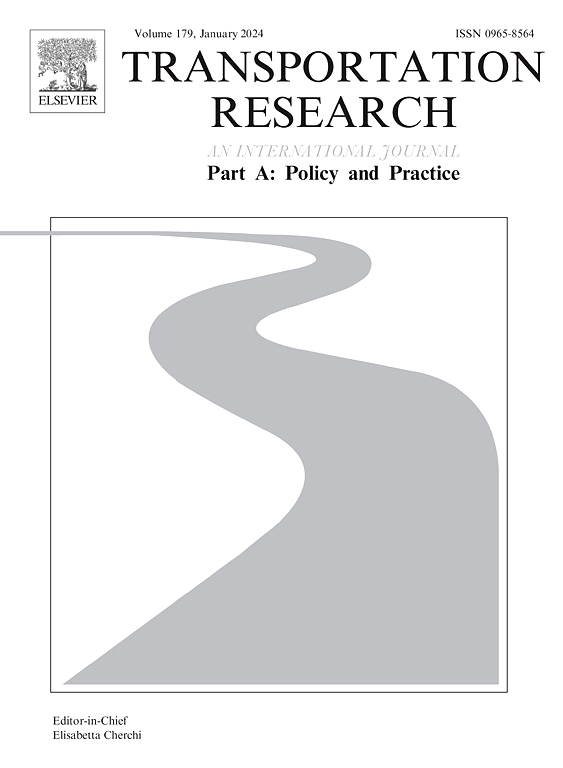利用车辆自动识别数据推断车辆行程的时空属性:方法与应用
IF 6.3
1区 工程技术
Q1 ECONOMICS
Transportation Research Part A-Policy and Practice
Pub Date : 2024-10-24
DOI:10.1016/j.tra.2024.104264
引用次数: 0
摘要
每日行程由个人一天的行程和活动组成,通常是许多旅行需求模型的基本输入。然而,目前的研究缺乏长期提取大规模样本每日行程的有效方法。为此,本研究提出了一种利用车辆自动识别(AVI)数据推断车辆每日行程(IDI)的方法。本研究构建了一个针对具体问题的概率图形模型,以定义在观测到 AVI 数据的情况下,某一行程的真实可能性。为了在大量可行状态中寻找最可能的行程,开发了候选运动状态生成算法和最佳行程搜索算法。基于现场测试数据进行了实证研究。与两个基准相比,所提出的 IDI 即使在观测数据缺失的活动中也能显著提高推断精度。此外,还对交通区域面积和数据收集进行了灵敏度分析,为管理部门和研究人员划分研究区域和放置传感器提供了指导。由于 AVI 系统几乎能捕捉到整个样本,因此通过 IDI 推断的车辆移动情况能更好地反映交通模式。这使得一系列与交通政策和实践相关的应用成为可能。交通拥堵跟踪和停车需求估算是两个应用实例。本文章由计算机程序翻译,如有差异,请以英文原文为准。
Inferring spatial–temporal attributes of vehicle itinerary with Automatic Vehicle Identification data: Methodology and application
Daily itinerary, consisting of an individual’s trips and activities on a day, is usually fundamental input for many travel demand models. However, current research lacks effective methods to extract daily itineraries of large-scale samples for a long period. To this end, this study presents a methodology to Infer Daily Itineraries (IDI) of vehicles with Automatic Vehicle Identification (AVI) data. A problem-specific Probabilistic Graphical Model is constructed to define how possible one itinerary is true given its observed AVI data. To seek the most possible itinerary among vast feasible states, a candidate movement state generation algorithm and optimal itinerary searching algorithm are developed. Empirical studies have been conducted based on field-test data. Compared with two benchmarks, the proposed IDI improved the inference accuracy significantly even for activities with missing observations. Sensitivity analyses on the size of traffic area zone and data collection have also been performed, which can provide guidance for administrations and researchers on the partition of the study region and placement of the sensors. As the AVI system captures almost entire samples, vehicle movements inferred by IDI can provide a better representation of traffic patterns. This enables a series of applications related to transportation policy and practice. Traffic congestion tracking and parking demand estimation are introduced as two application examples.
求助全文
通过发布文献求助,成功后即可免费获取论文全文。
去求助
来源期刊
CiteScore
13.20
自引率
7.80%
发文量
257
审稿时长
9.8 months
期刊介绍:
Transportation Research: Part A contains papers of general interest in all passenger and freight transportation modes: policy analysis, formulation and evaluation; planning; interaction with the political, socioeconomic and physical environment; design, management and evaluation of transportation systems. Topics are approached from any discipline or perspective: economics, engineering, sociology, psychology, etc. Case studies, survey and expository papers are included, as are articles which contribute to unification of the field, or to an understanding of the comparative aspects of different systems. Papers which assess the scope for technological innovation within a social or political framework are also published. The journal is international, and places equal emphasis on the problems of industrialized and non-industrialized regions.
Part A''s aims and scope are complementary to Transportation Research Part B: Methodological, Part C: Emerging Technologies and Part D: Transport and Environment. Part E: Logistics and Transportation Review. Part F: Traffic Psychology and Behaviour. The complete set forms the most cohesive and comprehensive reference of current research in transportation science.

 求助内容:
求助内容: 应助结果提醒方式:
应助结果提醒方式:


